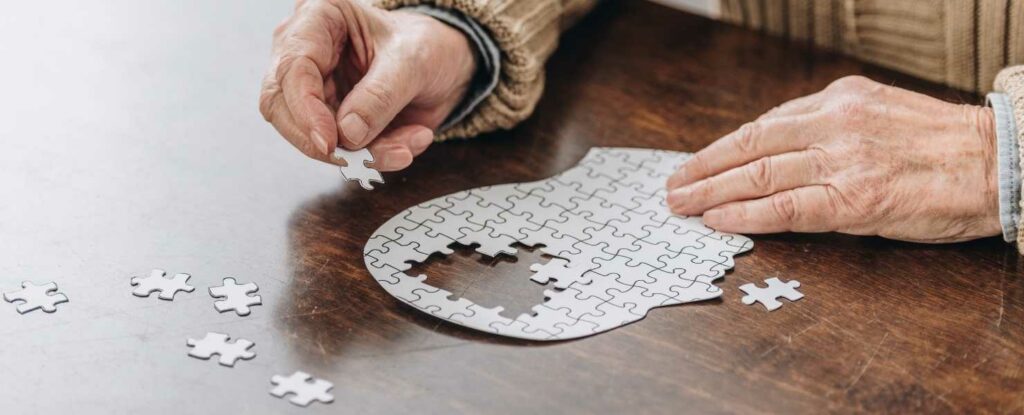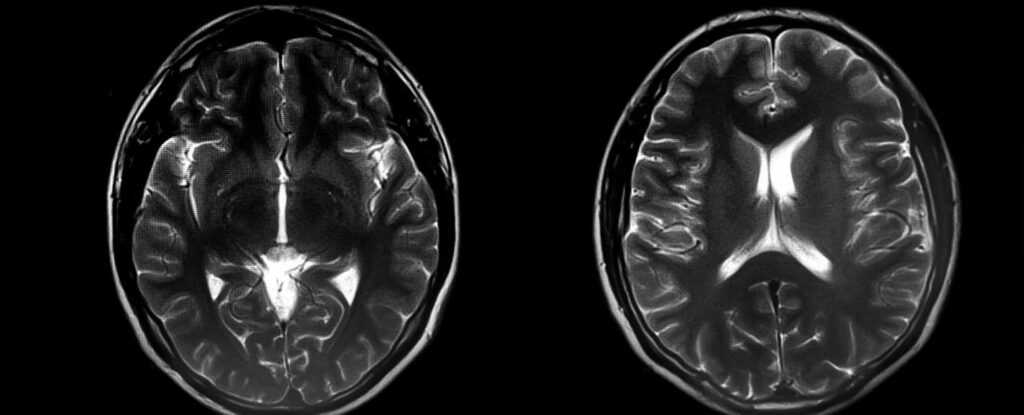Detecting early indicators of dementia can make all the difference because if it is recognized early, medicine may be able to slow down the diseases that cause brain damage.
There are many dementia symptom stages since dementia is a degenerative neurological illness. Because the changes are gradual, you or your parent may have more time to acquire an early diagnosis and reduce or prevent the progression.
Fortunately, early signs of dementia can be identified before the symptoms have a significant influence on daily life and overall quality of life. Dementia diagnosis might be challenging at times because there is no single straightforward test to do and early symptoms can mimic age-related changes.
To get started, we give a quick intro to dementia and dementia diagnosis, but here is the list of 10 early signs of dementia if you’d prefer to jump to it. You can click any to read more information. And you can also download a checklist for you to use if you’re concerned about early signs of dementia here.
- Forgetfulness that interferes with daily life
- A deficiency in problem-solving abilities
- Confusion
- Confused speech
- Item misplacement
- Difficulty in accomplishing previously familiar tasks
- Visual and spatial disorientation
- Withdrawal from work or social activities
- Sudden mood and personality shifts
- Poor decision-making skills
Additionally, we recommend taking a look at the 7 stages of Alzheimer’s disease as laid out by Dr. Barry Reisberg. You can read through these by jumping below.
What Exactly is Dementia?



Dementia is a degenerative disease that impairs a person’s memory, thinking, and behavior. Dementia is an umbrella term for a variety of indications and symptoms associated with cognitive impairments, such as memory loss. Dementia is not a specific condition, but rather a catch-all phrase for symptoms such as memory loss, forgetfulness, and loss of attention.
Dementia comes in many forms, including Parkinson’s disease with dementia, Lewy Body Dementia, Vascular Dementia, Early Onset Dementia, and Alzheimer’s disease. Alzheimer’s disease is the most common type of dementia, affecting more than 5.7 million people in the United States.
We recommend reading our Dementia 101 article and watching the video from our Trusted Advisor, Teepa Snow, in order to learn more about Dementia and cognitive decline.
How is Dementia Diagnosed?



There is no single test that can indicate whether or not your loved one has dementia. A comprehensive medical history, physical exam, laboratory tests, and spotting a pattern of loss of function and skills are all used by doctors to make a diagnosis. Doctors can diagnose dementia with a high degree of accuracy, but defining the specific form of dementia is more difficult. Biomarkers can aid in the precise diagnosis of Alzheimer’s disease, which falls under the category of dementia.
Cognitive Exams
A variety of tests can be used to assess your loved one’s cognitive abilities, including memory, learning, judgment, language, and attention span. These tests are useful indicators if they need to be evaluated further. If a test fails, your loved one should be referred to a professional.
GPCOG stands for General Practitioner Assessment of Cognition. GPCOG is a cognitive impairment screening instrument designed for use by a general practitioner, primary care physician, or family doctor.
The Mini-Cog is a three-minute test that consists of a scored recall test and a clock-drawing task. This exam can be used by healthcare providers to determine whether a full assessment and further evaluation are required.
Neurological Evaluation
A neurological examination is performed by a clinician to assess physical movement, balance, reflexes, and eye movement. This type of screening can assist in the discovery and treatment of disorders such as a stroke, brain tumor, Parkinson’s disease, or other illnesses that can affect a dementia diagnosis.
Brain Scanners
Brain imaging examinations can help rule out other causes of memory loss or impairment.
- A CT or MRI scan will look for signs of a stroke, hemorrhage, tumor, or hydrocephalus.
- PET Scan can reveal patterns of brain activity and aid in the diagnosis of numerous types of dementia, including vascular and frontotemporal dementia.
Laboratory Examinations
A blood test has the ability to uncover any physical issues that may cause mental impairment or hinder brain function, such as an underactive thyroid, symptoms of inflammation, low blood sugar, electrolyte levels, kidney or liver function, infection, or vitamin deficiency.
Psychological Examination
A mental health expert can assess a patient’s overall well-being and search for evidence of depression, mood swings, or other mental health conditions that may be causing memory loss symptoms.
Types of Dementia



Dementia with Lewy bodies
Dementia with Lewy bodies (DLB) patients exhibit several of the most prevalent dementia symptoms, such as problems with spatial awareness and memory loss.
If your loved one develops easrly signs of dementia with Lewy bodies, you may notice a change in their attentiveness, as well as symptoms more often linked with Parkinson’s Disease, like muscle stiffness, slower-than-usual movements and tremors.
Some patients with DLB have visual hallucinations and sleep difficulties, while another symptom is a likelihood to faint, which can lead to falls and severe injuries. DLB often advances slowly.
Frontotemporal Dementia (FTD)
Frontotemporal dementia, often known as FTD, causes symptoms related with the damaged section of the brain. Some people with it will struggle with social behavior, while others may struggle with comprehending language or facts.
You may notice personality changes in your loved one, such as an inability to conduct responsibly, or your loved one may lose interest in personal cleanliness.
Alzheimer’s Disease (AD)
Alzheimer’s disease is a well-known type of dementia. The early signs of Alzheimer’s diseases are usually quite sluggish, making it difficult to tell if your loved one has a problem, at least in the early stages.
Alzheimer’s patients frequently have difficulty remembering names or recalling recent events. They may ask the same question several times and struggle to find the right words. Some Alzheimer’s patients struggle with financial transactions, and many struggle with task planning and organization.
Vascular Dementia
This is the second most common type of dementia, and it is frequently caused by a stroke or mini-stroke. Most of the early symptoms of vascular dementia are the same as those of Alzheimer’s disease, such as trouble communicating, memory loss and cognitive disorientation, but additional symptoms may also be present, depending on the part of the brain affected.
Many people with vascular dementia have difficulty processing new information and have difficulty reasoning and paying attention. They may feel apathetic or get more emotional than normal.
Changes in the way your loved one walks and moves could be a clue that something is wrong. Frequent bladder troubles are another sign that your loved one is suffering from vascular dementia.
What Occurs During the Early Stages of Dementia?



In the early stages of dementia, an elderly adult’s daily life may begin to be influenced by their emerging symptoms, such as memory problems, slowed thought speed, behavior, and language. They will most likely begin to notice their symptoms. They’ll start to notice how these symptoms are affecting them. They may even become aware that they are becoming ill prior to receiving a diagnosis. This can be a difficult and perplexing procedure.
Despite the early symptoms of dementia, a person can often continue to live independently in the early stages of dementia. It’s crucial to note, though, that everyone is affected differently-based on the type of dementia, as well as factors like personality and surroundings.
Many people recognize and debate the seven stages of dementia, which specifically correspond to the stages of Alzheimer’s progression as described by Dr. Barry Reisberg, and they are as follows:
- Stage 1 (There is no cognitive deterioration): The condition is not visible and cannot be detected. There is no dementia. The person in stage 1 functions properly, has no memory loss, and is psychologically well. People who do not have dementia are said to be in Stage 1.
- Stage 2 (Moderate cognitive deterioration): Very little decline in cognitive abilities— minor memory issues may occur. This stage refers to typical amnesia associated with aging, such as forgetfulness of names and where familiar objects such as keys were left. Symptoms are not visible to loved ones, family, or the patient’s doctor.
- Stage 3 (No dementia, but mild cognitive impairment): Mild decline – the family may notice cognitive changes. This stage is characterized by increased forgetfulness, slight trouble concentrating, and modest reduction in work performance. People may become more disoriented or have difficulty finding the appropriate words. At this point, loved ones and relatives will observe a drop in problem solving and trip to new places. It should be noted that different scholars may classify this stage as early or stage 1 of 3 stages (severe, moderate or early staging systems).
- Stage 4 (Moderate cognitive deterioration): Early-stage Alzheimer’s disease. Moderate decline – noticeable signs such as poor short-term memory. Stage 4 symptoms include trouble concentrating, a loss of recent event memory, and difficulties managing funds and/or traveling alone to new places. People have difficulty performing complex activities and may be underestimating their mental capacity. They may also begin to retreat from family and friends as socialization becomes more challenging. During dementia testing, physical exam and patient interview, a physician can notice obvious cognitive abnormalities.
- Stage 5 (Moderately severe cognitive impairment): Here, Dementia is in its middle stages. Moderately severe deterioration— at this stage, persons may require assistance with daily duties. Stage 5 sees elderly adults having significant memory deficits and requiring support to conduct their daily activities, for example, preparing meals, bathing or dressing. Memory loss is prevalent and may entail serious relevant continuous memory problems; for example, people may forget their address or phone number, as well as the time, day, or location.
- Stage 6 (Severe cognitive deterioration): Dementia in its middle stages. People in this stage of dementia will require frequent supervision and expert care. They require substantial support with daily activities such as clothing. They begin to forget the names of close family members and have poor recall of recent occurrences. Many patients can recall only a few details from their past. They also struggle with counting down from ten and completing activities. In this stage, incontinence (loss of bladder or bowel control) is a concern. The ability to communicate deteriorates. Personality changes, such as delusions (thinking something that is not true), compulsions, i.e. repeating a simple behavior like cleaning), or agitation and anxiety, may arise.
- Stage 7 (Extreme cognitive deterioration): Dementia here is in its later stages. Severe decline — the final stage of dementia in which persons lose their ability to talk or respond to their surroundings. They require assistance with the majority of daily chores (e.g., using the toilet, eating). They frequently lose psychomotor skills, such as the ability to walk or sit in a chair. They will require ongoing specialized treatment.
Early Symptoms of Dementia



As dementia becomes more prevalent around the world, it’s normal to be anxious about our parents or senior loved ones becoming forgetful. However, dementia is more than just forgetting and can emerge as a result of a number of other conditions. If you’re becoming increasingly concerned about a loved one, knowing the early stages of dementia will help you determine whether or not your family needs to seek the advice of a healthcare professional.
Dementia is a neurological disorder that affects cognitive skills and memory. It is more than just forgetfulness.
A person must have at least two categories of impairment that severely interfere with daily life to be diagnosed with dementia.
In addition to memory problems, elderly people may have difficulties with:
- Reasoning
- Communication
- Language
- Focus
10 Early Signs of Dementia



The Alzheimer’s Association has compiled a list of the top early indications of dementia in order to encourage early medical intervention.
If you detect any of the following signs or symptoms of dementia in a parent or senior loved one, make an appointment with a doctor:
1. Forgetfulness that interferes with daily life
A person in the early stages of dementia will frequently forget new information or forget significant dates and events. For appointments, he or she may become more reliant on memory aides or family and friends. This is not the same as a typical age-related shift in which a person forgets names but remembers them later.
2. A deficiency in problem-solving abilities
Your loved one may be unable to maintain a budget, forget to pay bills, or have difficulty following a familiar recipe in the early stages of dementia. Things may take longer than usual because analyzing and solving difficulties will require more energy.
3. Confusion
Dementia patients frequently lose sight of time and space, forgetting the day or week. He or she may forget where they are or how they got there.
4. Confused speech
People in the early stages of the condition may find it difficult to follow or participate in a discussion. They may have difficulty remembering the names of familiar items and may struggle with language.
5. Item misplacement
A person suffering from the condition may misplace objects and then have difficulty retracing his or her steps to find the item. This may worsen as dementia progresses, leading the person to accuse others of stealing.
6. Difficulty in accomplishing previously familiar tasks
Even in the early stages of the condition, it might be difficult to complete daily duties. This can manifest as getting lost when driving to a familiar location, forgetting game rules, or having difficulty remembering how to perform daily duties and housework.
7. Visual and spatial disorientation
The condition can also cause vision impairments, such as difficulty seeing certain colors or contrast, which can make driving difficult.
8. Withdrawal from work or social activities
Because of other changes such as confusion, disorientation, and loss of speech, someone in the early stages of the disease may begin to isolate themselves from social or professional gatherings. They may leave a social club due to misunderstanding or fear.
9. Sudden mood and personality shifts
People in the early stages of dementia may also experience abrupt mood and personality changes. They are prone to become worried, scared, paranoid, and quickly agitated.
10. Poor decision-making skills
Because of their poor judgment, people with dementia are regularly targeted by scammers. A person suffering from the condition is more likely to reveal personal information or donate money to a telemarketer. They may also struggle to keep themselves clean and tidy, neglecting to wash laundry or take a shower.
Bonus – Download this PDF from the Alzheimer’s Association
Conclusion



In today’s environment, we can be overly careful when it comes to looking for indicators of dementia. While it is critical to obtain an early diagnosis, we might also be overly concerned about the health of our loved ones.
It’s natural for seniors to experience memory lapses and emotional swings as they age, so not every missing object or dropped word should be cause for concern. However, if you observe a suspected symptom fast worsening or a cluster of symptoms, you should consider speaking with your loved one.
Keep your elder family members informed of your suspicions and include them in any decisions you make. If you believe a trip to the doctor is important, accompany your loved one to offer your support. Working as a family to address significant health conditions, such as dementia, is always the best way to go.







